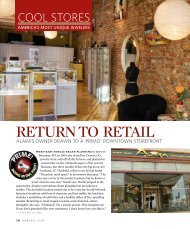Cisco - TABPI
Cisco - TABPI
Cisco - TABPI
Create successful ePaper yourself
Turn your PDF publications into a flip-book with our unique Google optimized e-Paper software.
NEWS&ANALYSIS<br />
FRONT OFFICE<br />
Oracle enhances<br />
Sales application<br />
ORACLE LAST WEEK RELEASED<br />
Version 11.5.9 of its Oracle Sales<br />
application, with several new<br />
enhancements designed to help<br />
salespeople.<br />
The enhancements include<br />
a new application called Oracle<br />
Proposals, which generates personalized<br />
sales proposals from<br />
templates. These proposals can<br />
then be tracked and monitored<br />
for effectiveness.<br />
This release also supports<br />
tighter integration with Oracle’s<br />
Order Management applications,<br />
allowing sales representatives<br />
to check customers’<br />
credit histories during the<br />
quoting process.<br />
The software is available now<br />
with suite and component pricing<br />
models.<br />
The next version of the software,<br />
11.5.10, expected in nine<br />
months to a year, will add new<br />
capabilities for collaborative<br />
selling and partner relationship<br />
management, officials said.<br />
—Dennis Callaghan<br />
STANDARDS<br />
OASIS ratifies<br />
UDDI specification<br />
THE ORGANIZATION FOR THE<br />
Advancement of Structured<br />
Information Standards last week<br />
announced the ratification of<br />
Universal Description, Discovery<br />
and Integration Version 2 as an<br />
OASIS open standard.<br />
UDDI, the most broadly supported<br />
Web services standard,<br />
allows users to publish, find and<br />
use Web services.<br />
OASIS officials said members<br />
of the OASIS UDDI Specification<br />
Technical Committee include<br />
Computer Associates International,<br />
Fujitsu, IBM, Iona<br />
Technologies, Microsoft, Novell,<br />
OpenNetwork Technologies,<br />
Oracle, SAP, SeeBeyond Technology,<br />
Sun Microsystems, Tata<br />
Consultancy Services and others.<br />
—Darryl K. Taft<br />
14 eWEEK n MAY 26, 2003<br />
Handheld applications redux<br />
DEVICE IQ SHUNS<br />
MIDDLEWARE FOR APPS<br />
By Carmen Nobel<br />
Ateam of engineers and<br />
developers from Palm<br />
Inc.’s ill-fated enterprise<br />
software group this fall will<br />
launch a company that will aim<br />
to create more enterprise applications<br />
for more devices than<br />
their previous employer.<br />
To do it, Device IQ Inc. is<br />
avoiding a generic<br />
middleware platform<br />
in favor of customizing<br />
applications for<br />
companies.<br />
“There is an enormous<br />
lack of good<br />
device-side software,”<br />
said Bob Pascazio,<br />
president of Device<br />
IQ, in New York. “So<br />
there is some work we Palm<br />
are doing on mobile<br />
embedded systems—<br />
that are not Palms or<br />
phones—that do not<br />
have an OS but communicate<br />
to a PC periodically<br />
through USB<br />
[Universal Serial Bus]<br />
or Bluetooth.”<br />
Pascazio declined<br />
to name the devices<br />
for which Device IQ<br />
will be designing software<br />
because many of them have yet<br />
to be released, but he said<br />
the company is working on<br />
applications for existing hardware,<br />
too. “We are also writing<br />
some sophisticated client-side<br />
applications on phones, Palms<br />
and Pocket PCs,” he said. “Also<br />
for PDAs we have a Web site<br />
deal, similar to Vindigo [Inc.’s]<br />
offering.” Vindigo creates<br />
Web-based, location-based<br />
applications for several handheld<br />
platforms.<br />
Pascazio was a lead devel-<br />
oper at ThinAirApps Inc., a<br />
company that Palm bought<br />
in December 2001 to create a<br />
wireless middleware platform<br />
for its Tungsten handheld line,<br />
which is aimed at corporate<br />
users. At the time, Todd Bradley,<br />
then chief operating officer<br />
of Palm, called the acquisition<br />
“a linchpin of our longterm<br />
enterprise and wireless<br />
strategies.” But Palm nixed the<br />
plans for the middleware,<br />
Wavering on wireless<br />
Microsoft Corp.<br />
� 1998 Co-founds Wireless Knowledge Inc.<br />
� 2000 Announces initial plans for Microsoft<br />
Mobile Information Server, which will compete<br />
with Wireless Knowledge<br />
� 2001 Sells off Wireless Knowledge stake<br />
� 2002 Announces phaseout of MMIS<br />
� Early 2001 Announces plans to buy<br />
Extended Systems Inc.; nixes the plans a few<br />
months later<br />
� Late 2001 Announces acquisition of<br />
ThinAirApps<br />
� 2002 Announces Tungsten line of handhelds<br />
and accompanying middleware based<br />
on ThinAirApps technology<br />
� 2003 Reveals that it will not release middleware<br />
for Tungsten<br />
dubbed Tungsten MIMS<br />
(Mobile Information Management<br />
Server), a couple of<br />
months ago, saying it no<br />
longer fits its focus.<br />
Life at Palm after the Thin-<br />
AirApps acquisition was frustrating<br />
up until Palm shut<br />
down the New York office in<br />
March, Pascazio said. “We had<br />
Tungsten MIMS Version 1.8<br />
almost out the door,” he said.<br />
“It was an amazing product. It<br />
worked on the Tungsten T with<br />
Bluetooth to a GPRS [General<br />
Packet Radio Service]<br />
phone, worked on the Tungsten<br />
C, Tungsten W, et cetera.<br />
It had full groupware support<br />
for Exchange, Domino,<br />
IMAP. They dumped the<br />
whole thing.” Palm officials<br />
said the company’s future software<br />
plans are based on partnerships<br />
with large software<br />
companies and carriers, which<br />
like to choose their own backend<br />
software.<br />
“Some of the ThinAir technology<br />
is still in use,”<br />
said Jon Oakes, senior<br />
director of business<br />
solutions at Palm and<br />
former CEO of Thin-<br />
AirApps, who works<br />
from his New York<br />
home now that Palm’s<br />
office there has closed.<br />
“Some technologies<br />
will be a part of the<br />
IBM WebSphere Everyplace<br />
Access suite.<br />
We were proud to be<br />
part of WEA Version<br />
4.3.”<br />
Explaining why<br />
MIMS was nixed,<br />
Bradley said in March,<br />
“In the enterprise<br />
arena, market conditions<br />
have caused us<br />
to rebalance our areas<br />
of emphasis.”<br />
Palm will still make client<br />
software. Oakes said: “We will<br />
continue to develop our own<br />
software solutions. But we<br />
intend to leverage software<br />
partners for most of our backend,<br />
connectivity-oriented<br />
solutions.”<br />
Palm has a history with IBM<br />
competitor BEA Systems Inc.<br />
In August, Palm announced<br />
plans to work with BEA and its<br />
WebLogic Server to develop<br />
what was to be the first Web-<br />
Logic Workshop control for<br />
handheld devices. ´













